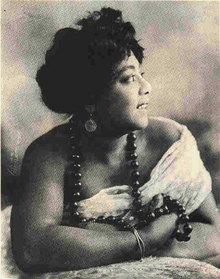- Mamie Smith
-
Mamie Smith 
Background information Birth name Mamie Robinson Born May 26, 1883
Cincinnati, Ohio, United StatesDied September 16, 1946 (aged 63)
New York, New York, United StatesGenres Blues Occupations Actress, dancer, singer Instruments Vocals Mamie Smith (née Robinson) (May 26, 1883 – September 16, 1946) was an American vaudeville singer, dancer, pianist and actress, who appeared in several films late in her career. As a vaudeville singer she performed a number of styles including jazz and blues. She entered blues history by being the first African American artist to make vocal blues recordings in 1920. Willie "The Lion" Smith (not her husband) explained the background to that recording in his (ghosted) autobiography, Music on My Mind.
Contents
Early life
Mamie Robinson was born probably in Cincinnati, Ohio, although no records of her birth exist.[1][2] When she was ten years old, she found work touring with a white act called the Four Dancing Mitchells.[3] As a teenager, she danced in Salem Tutt Whitney's Smart Set.[1] In 1913, she left the Tutt Brothers to sing in clubs in Harlem and married a waiter named William "Smitty" Smith.[3]
Musical career
On August 10, 1920, in New York City, Smith recorded a set of songs all written by the African American songwriter, Perry Bradford, including "Crazy Blues" and "It's Right Here For You (If You Don't Get It, 'Tain't No Fault of Mine)", on Okeh Records.[4] It was the first recording of vocal blues by an African American artist,[5][6] and the record became a best seller, selling a million copies in less than a year.[7] To the surprise of record companies, large numbers of the record were purchased by African Americans, and there was a sharp increase in the popularity of race records.[8] Because of the historical significance of "Crazy Blues", it was inducted into the Grammy Hall of Fame in 1994,[9] and, in 2005, was selected for permanent preservation in the National Recording Registry at the Library of Congress.
Although other African Americans had been recorded earlier, such as George W. Johnson in the 1890s, they were African American artists performing music which had a substantial following with European-American audiences. The success of Smith's record prompted record companies to seek to record other female blues singers and started the era of what is now known as classic female blues.[6] It also opened up the music industry to recordings by, and for, African Americans in other genres.
Smith continued to make a series of popular recordings for Okeh throughout the 1920s. She also made some records for Victor. She toured the United States and Europe with her band "Mamie Smith & Her Jazz Hounds" as part of "Mamie Smith's Struttin' Along Review".[10] She was billed as "The Queen of the Blues". This billing of Mamie Smith was soon one-upped by Bessie Smith, who called herself "The Empress of the Blues."
Film career and later years
Mamie Smith appeared in an early sound film, Jail House Blues, in 1929. She retired from recording and performing in 1931. She returned to performing in 1939 to appear in the motion picture Paradise in Harlem produced by her husband Jack Goldberg. She appeared in further films, including Mystery in Swing, Sunday Sinners (1940), Stolen Paradise (1941), Murder on Lenox Avenue (1941), and Because I Love You (1943). She died in 1946, in New York.
References
- ^ a b Oliver, Paul, "Smith (née Robinson), Mamie", The New Grove Dictionary of Jazz, 2nd edition (Oxford University Press), http://www.oxfordmusiconline.com/subscriber/article/grove/music/J417000?q=mamie+smith&search=quick&pos=2&_start=1#firsthit, retrieved April 22, 2010
- ^ Tracy, Steven C. (1998). Going to Cincinnati: A History of the Blues in the Queen City. University of Illinois Press. p. 5. ISBN 0252067096. http://books.google.co.uk/books?id=OGyWw-M5wFsC&pg=PA5.
- ^ a b Gates, Henry Louis; Higginbotham, Evelyn Brooks (2009). Harlem Renaissance lives from the African American national biography. Oxford University Press US. p. 458. ISBN 0195387953. http://books.google.co.uk/books?id=E_vRLcgEdGoC&pg=PA458.
- ^ Weisenfeld, Judith (2007). Hollywood be thy name: African American religion in American film, 1929-1949. University of California Press. p. 287. ISBN 0520251008. http://books.google.co.uk/books?id=B-NAR_zWZoIC&pg=PA287.
- ^ Whalan, Mark (2010). American Culture in the 1910s. Edinburgh University Press. p. 148. ISBN 074863424X.
- ^ a b Du Noyer, Paul (2003). The Illustrated Encyclopedia of Music (1st ed.). Fulham, London: Flame Tree Publishing. p. 154. ISBN 1-904041-96-5.
- ^ Schuller, Gunther (1986). Early jazz: its roots and musical development. Oxford University Press US. p. 226. ISBN 0195040430. http://books.google.co.uk/books?id=PfwfMTWBGgYC&pg=PA226.
- ^ Gates & Higginbotham, p. 460
- ^ Grammy Hall of Fame
- ^ Kernfeld, Barry Dean (2002). "Mamie Smith". The New Grove Dictionary of Jazz (2nd edition, vol. 3 ed.). London: MacMillan. pp. 615. ISBN 1561592846.
External links
- Mamie Smith African American Registry
- Mamie Smith at Allmusic
- Mamie Smith at the Internet Movie Database
- Mamie Smith Blues Online Biography with photos
- Mamie Smith on RedHotJazz.com with .ram files of her early recordings
- Mamie Smith and the Birth of the Blues Market NPR special on the selection on "Crazy Blues" to the 2005
- Mamie Smith at Find a Grave
Categories:- 1883 births
- 1946 deaths
- Classic female blues singers
- African American female singers
- African American musicians
- American blues singers
- Blackface minstrel performers
- People from Cincinnati, Ohio
- Vaudeville performers
- Okeh Records artists
Wikimedia Foundation. 2010.
